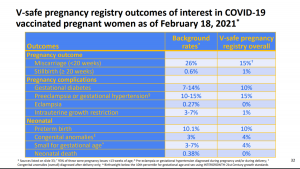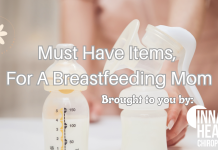Let me set the stage, dear reader: It’s January 2021 and two vaccines for the COVID-19 virus have been developed and are being distributed. I am so ready for life to be back to any kind of “normal” and I’m anxiously awaiting the day I can get vaccinated.
And then…I find out I’m pregnant.
This is baby #3, so I’m very aware of the ups and downs of pregnancy at this point. But how does a global pandemic affect pregnancy? Do I need to be doing something different to protect myself? Could I still get vaccinated? Should I get vaccinated?
I’m a big believer in doing research and consulting the experts, so I turned to my trusty OB-GYN, Dr. Cynthia Okin, MD. Dr. Okin practices at Pro-Medica Physicians OB-GYN in Maumee. She gave me sound advice and I thought I’d ask her a few more questions to help any other pregnant mom who might have similar concerns.

https://www.promedica.org/provider/cynthia-r-okin-md-obstetrics
When news of a deadly coronavirus began circulating in early 2020, did you have any sense or gut feeling about what was coming?
Early in 2020 I was watching the news and listening to the stories coming out of Europe and I had some growing concerns but I was still traveling and hadn’t made any changes. Then, about two weeks before everything shut down I read an ominous message from a specialist on an online forum of 75,000 female docs from across the globe and she said don’t plan on traveling for at least a year and make sure you have food and necessities. At that point I knew it was hitting us here at home and I told my husband: we need two weeks of food, toilet paper and Clorox wipes 😉
I’ve read that pregnant women are more at-risk for COVID-19. Why is that? Are pregnant women more at-risk for other illnesses as well?
Pregnant women are at increased risk of having severe illness, being placed on a ventilator, and even at increased risk of dying from COVID-19. They are also at increased risk of having severe illness from the flu. When we are pregnant, our immune systems are less effective and our lungs can have decreased capacity.
What concerns or hopes did you have during the last year as you knew various vaccines were being developed?
I was in awe over how the entire scientific community worked together to find a solution. I think that it is amazing that we have three very effective vaccines available here in the United States. I do wish that they had data on pregnant women and other younger groups as well.
Are pregnant women typically included in vaccine trials?
Pregnant women are not usually part of clinical studies. The American College of Obstetricians and Gynecologists did advocate for the inclusion of pregnant women in the original COVID-19 vaccine trials. However, studies in pregnant women have now begun and there are pregnancy registries. As of February 16, 2021, over 30,000 pregnancies have self-registered and there does not appear to be increased complications from vaccines. (See more data here from a recent presentation at the CDC)

What vaccines are already recommended for pregnant women?
We do recommend other vaccines in pregnancy. The flu vaccine is recommended to protect the pregnant woman from severe respiratory infection. In pregnancy, flu can lead to Acute Respiratory Distress Syndrome which is when fluid builds up in the lungs and require a ventilator. We also recommend the Tdap for Pertussis, which is whooping cough. Whooping cough can be fatal in infants as newborns are unable to be vaccinated. We give it in pregnancy so that the baby is born with antibodies and both mom and baby are protected.
We know that all three vaccines have been given Emergency Use Authorization from the FDA, but how safe are they for pregnant women?
Currently, we don’t have a completed study in pregnancy, although there is one underway at Duke University. However, in animal studies there were no increased risk of birth defects or increased risk of miscarriage. Additionally, the pregnancy registries suggest that the side effects in pregnancy are similar to those who are are not pregnant. The vaccine is not a live virus and it does not enter the cell nucleus. It does not alter DNA; it simply causes our bodies to mount an immune reaction to fight the virus. The use of the vaccine is backed by the American College of Obstetricians and Gynecologists, as well as the Society of Maternal Fetal Medicine.
Ohio began offering COVID-19 vaccines to pregnant women in early March. How are you helping patients with that decision?
As with any vaccine or test in pregnancy, it is the patient’s choice. We let our patients know the vaccine is available. The vaccine is felt to be safe and COVID-19 in pregnancy can be serious. But it is a patient’s choice and if she is not comfortable getting the vaccine then we support that decision. We reinforce continued safety precautions with good hygiene, mask wearing and following the latest social distancing recommendations.
What’s your best advice to a pregnant mom on the fence about getting the vaccine?
My best advice for anyone on the fence regarding the vaccine: COVID-19 is scary. I have known super healthy people get really sick from it. I have seen people that I was super scared that when they got COVID-19 they were going to get really sick, but did ok. You just don’t always know how someone will react. Pregnancy makes you vulnerable. Sometimes you have uncomfortable side-effects from the vaccine such as chills, body aches, fever or headache, but they resolve. Ultimately, everyone needs to decide what is best for them; taking into consideration their own risks and personal situations.
Ultimately, I chose to be vaccinated against COVID-19. I’ll receive my second dose in a couple of weeks. It was the best decision for my health, my baby, and my family, for many reasons. Ask your questions, do your research (remember: just because someone has a YouTube channel doesn’t make them an expert), and consult your doctor.












